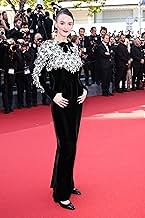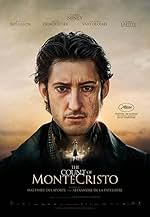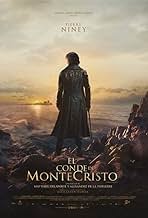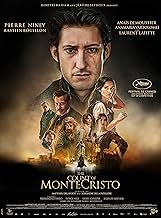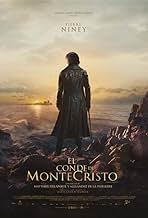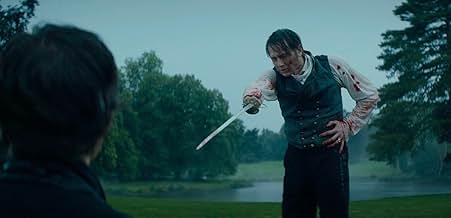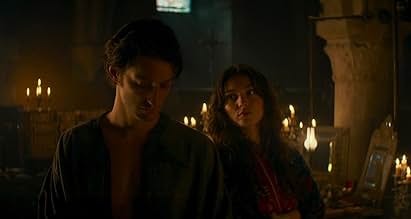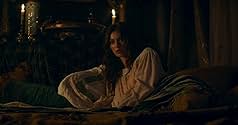Eine Neuauflage des berühmten Romans von Alexandre Dumas.Eine Neuauflage des berühmten Romans von Alexandre Dumas.Eine Neuauflage des berühmten Romans von Alexandre Dumas.
- Auszeichnungen
- 6 Gewinne & 17 Nominierungen insgesamt
Laurent Lafitte
- Gérard de Villefort
- (as Laurent Lafitte de la Comédie Française)
Stéphane Varupenne
- Caderousse
- (as Stéphane Varupenne de la Comédie Française)
Abde Maziane
- Jacopo
- (as Abdé Maziane)
Zusammenfassung
Reviewers say 'The Count of Monte-Cristo' adaptation garners mixed reactions, highlighting visual richness, strong performances, and deviations from the original novel. Praise is given to the cinematography, production design, and Pierre Niney's portrayal of Edmond Dantès. However, the script faces criticism for altering key plot points, characters, and the novel's ending, which many feel reduces the story's depth and emotional impact. Some appreciate the modernization and streamlined narrative, while others miss the novel's complexity and moral dilemmas.
Empfohlene Bewertungen
I read the books and saw two other versions of it as a film.
I asked myself what was the idea to make another version even though 18 exist already.
I watched it in French and realized that it is pretty far off the original storyline. Some characters are missing and others adapted. Apart from the great costumes and the brilliant locations, it seemed to me that only the beautiful, 'rich' sides were shown. The prison seemed too romanticised to me, as did the society. The Count could hardly stand out from the others due to his wealth and mystique, because this didn't always come to the surface.
Nevertheless, the film is entertaining and I was never bored. It managed to tell the whole story, although in a different way. Unfortunately, I couldn't answer the question of why this film was made, because it's just another version.
Watch the film if you don't know the story yet and like a romanticised story. Otherwise, I recommend the book by Alexandre Dumas and the film 'The Count of Monte Cristo 2002'.
I asked myself what was the idea to make another version even though 18 exist already.
I watched it in French and realized that it is pretty far off the original storyline. Some characters are missing and others adapted. Apart from the great costumes and the brilliant locations, it seemed to me that only the beautiful, 'rich' sides were shown. The prison seemed too romanticised to me, as did the society. The Count could hardly stand out from the others due to his wealth and mystique, because this didn't always come to the surface.
Nevertheless, the film is entertaining and I was never bored. It managed to tell the whole story, although in a different way. Unfortunately, I couldn't answer the question of why this film was made, because it's just another version.
Watch the film if you don't know the story yet and like a romanticised story. Otherwise, I recommend the book by Alexandre Dumas and the film 'The Count of Monte Cristo 2002'.
Well, this a great piece of cinema, the actors play well, the scenes are well designed and the music is top notch. Yet, at someone that read the book before, a lot of the actual story, is not just missing but heavily modified. This is frustrating and they main reason it's a 8 and not 10, but I guess taking a 6 books story into a 3 hours move isn't that easy. Some of the original characters are missing and grouped into new character (Angelel). So, if you are not a Dumas fanatic, go watch it, you will have a good time ! The 3 hours feel like 20 minutes, with good romance, great costumes, great action scenes and drama.
I will not deny it, I think the film is really beautiful : production design, costumes, props... and of course lighting (congrats M. Bolduc) and many other details helped make it a wonderful experience for the eyes, in my opinion.
Now with a plot so huge as with Dumas', so many characters, theads, sub-stories and such, the authors had to cut things, adapt, re-write... betray, as is often necessary or critical with any adaptation!
That's a given.
But why dishonor the original author's choices (Dumas')?
Why betray the lessons he wanted to impart : Monte Cristo's moral dilemma, his good nature overall, his help to so many, and unrivaled loyalty to anyone who had been good to him or deserved it in any way ?
Why change Haydée's love for him for a silly romance?
Even Mercedes' understanding of Monte Cristo's actions and why she can't be saved, and why Albert has to follow her are admirable, in the book...
And what are we left with, here?
Pure show?
I can assure you it's not what remains, when you read it.
Now with a plot so huge as with Dumas', so many characters, theads, sub-stories and such, the authors had to cut things, adapt, re-write... betray, as is often necessary or critical with any adaptation!
That's a given.
But why dishonor the original author's choices (Dumas')?
Why betray the lessons he wanted to impart : Monte Cristo's moral dilemma, his good nature overall, his help to so many, and unrivaled loyalty to anyone who had been good to him or deserved it in any way ?
Why change Haydée's love for him for a silly romance?
Even Mercedes' understanding of Monte Cristo's actions and why she can't be saved, and why Albert has to follow her are admirable, in the book...
And what are we left with, here?
Pure show?
I can assure you it's not what remains, when you read it.
It's hard not to notice that modern adaptations of classical works often tend to sacrifice depth and complexity for the sake of fast pace and entertainment. As a result, the special atmosphere and emotional depth inherent in the original texts are often lost. "The Count of Monte Cristo" by Alexandre Dumas is not just a twisted story of revenge with many bright twists, it is a reflection on life and how a person is transformed by circumstances and his own decisions. Alas, the new film adaptation, and this, of course, in my opinion, coped with the task of conveying this transformation - satisfactorily, but no more, leaving the characters at a simple and understandable level of archetypes.
Expectations did not come from an empty place, because many people read this fascinating tragedy of revenge and had hopes to see the development and deepening of the characters on a par with the original source. At the same time, the audience was offered a set of events that take place too quickly, as if on a high-speed cinema highway. Deep emotions, nuances of character, dramatic internal conflicts - all this was clearly not enough. But it is these details that make the work alive and truly memorable. Yes, undoubtedly, a thousand pages of a novel cannot be transferred into one film, but this is the power of creativity - the ability to revive images and give the viewer empathy. In the film, all this is there, but dosed, within the framework of the standard form of monosyllabic presentation.
The film is not bad, but spoiling Dumas means being completely incompetent, and, to my joy, I can't blame anyone for that. But I expected more and I'm a little disappointed. The whole film was shot with a 24 mm wide-angle lens, and it was unnecessary: there are clearly not enough close-ups, especially when the actors play well. Despite the decent acting, the characters seem to be unsaid and aimless, reduced to simplified and stripped-down images.
During the viewing, I hoped to see a philosophical reassessment or depth of thought in the scene with "Abbé Faria", but, unfortunately, only the Soviet painting by Georgy Jungwald-Khilkevich with Alexei Petrenko as the abbot was able to prepare the viewer, lay the foundation for the climax, making them realize the suffering of the prisoners and catch the main question: "What are you up to Will you spend your life, for revenge or for good?". After this episode, it became clear that the story would quickly sweep through the pages of the fireproof manuscript, and so it turned out.
The connection with the epoch and with the literary echoes of the past, which give the original its special flavor and indescribable integrity, has disappeared. Perhaps this is a sign of the times. Modern technology allows you to create impressive visual effects, but no technique can replace the power of a story, the ability to convey a mood and invite the viewer into a deep understanding of life. One thing is for sure: trying to adapt classics is always a challenge that requires incredible skill and understanding of the text. This is a difficult task, and, alas, not everyone can overcome this path, but the task was done well, although there was a residue of disappointment.
Expectations did not come from an empty place, because many people read this fascinating tragedy of revenge and had hopes to see the development and deepening of the characters on a par with the original source. At the same time, the audience was offered a set of events that take place too quickly, as if on a high-speed cinema highway. Deep emotions, nuances of character, dramatic internal conflicts - all this was clearly not enough. But it is these details that make the work alive and truly memorable. Yes, undoubtedly, a thousand pages of a novel cannot be transferred into one film, but this is the power of creativity - the ability to revive images and give the viewer empathy. In the film, all this is there, but dosed, within the framework of the standard form of monosyllabic presentation.
The film is not bad, but spoiling Dumas means being completely incompetent, and, to my joy, I can't blame anyone for that. But I expected more and I'm a little disappointed. The whole film was shot with a 24 mm wide-angle lens, and it was unnecessary: there are clearly not enough close-ups, especially when the actors play well. Despite the decent acting, the characters seem to be unsaid and aimless, reduced to simplified and stripped-down images.
During the viewing, I hoped to see a philosophical reassessment or depth of thought in the scene with "Abbé Faria", but, unfortunately, only the Soviet painting by Georgy Jungwald-Khilkevich with Alexei Petrenko as the abbot was able to prepare the viewer, lay the foundation for the climax, making them realize the suffering of the prisoners and catch the main question: "What are you up to Will you spend your life, for revenge or for good?". After this episode, it became clear that the story would quickly sweep through the pages of the fireproof manuscript, and so it turned out.
The connection with the epoch and with the literary echoes of the past, which give the original its special flavor and indescribable integrity, has disappeared. Perhaps this is a sign of the times. Modern technology allows you to create impressive visual effects, but no technique can replace the power of a story, the ability to convey a mood and invite the viewer into a deep understanding of life. One thing is for sure: trying to adapt classics is always a challenge that requires incredible skill and understanding of the text. This is a difficult task, and, alas, not everyone can overcome this path, but the task was done well, although there was a residue of disappointment.
Not once was I bored. Not once did I find inconsistencies. Sceneries and sets were to notch. The acting never pulled me out of the story, it keeps you there from start to finish.
French cinema produces a lot of forgettable movies (in my opinion), a lot of fun ones, some greats and here and there a movie that actually makes me love cinema and the theater. Le comte de Monte-Cristo is of the latter.
Rarely do I find a movie that depicts love, friendship, treason, courage, solitude, caring, vengeance, and much more, in at least a decent manner. Nothing felt rush to me. The three hours were deserved and it felt like less than two.
I encourage you to watch this movie, it has many qualities and it won't be a waste of time.
Now if you are a Dumas enthusiast, you opinion will certainly differ.
French cinema produces a lot of forgettable movies (in my opinion), a lot of fun ones, some greats and here and there a movie that actually makes me love cinema and the theater. Le comte de Monte-Cristo is of the latter.
Rarely do I find a movie that depicts love, friendship, treason, courage, solitude, caring, vengeance, and much more, in at least a decent manner. Nothing felt rush to me. The three hours were deserved and it felt like less than two.
I encourage you to watch this movie, it has many qualities and it won't be a waste of time.
Now if you are a Dumas enthusiast, you opinion will certainly differ.
Wusstest du schon
- WissenswertesWith a budget estimated in EUR42.9 million, The Count of Monte Cristo is the most expensive French film of 2024.
- PatzerWhen Albert watches Hydee sing and play the guitar, it is very obvious that she is not even touching the strings half of the time.
- Zitate
Danglars: The story makes no sense. We're swimming in madness. My boats were still in Marseilles yesterday. I will need a delay to pay you back. If...
Edmond Dantès: You have nothing left, Baron. Everything that was yours is now mine. The only thing you have left are these clothes. Leave Paris, and perhaps I will not let your wife and your daughter starve.
Danglars: But, Count, I...
Edmond Dantès: Do you find me brutal, Baron? "Not only do I know it, but I take pride in it." You should escort your wife home. She looks quite pale.
- VerbindungenFeatured in La grande semaine: Folge #1.13 (2024)
Top-Auswahl
Melde dich zum Bewerten an und greife auf die Watchlist für personalisierte Empfehlungen zu.
- How long is The Count of Monte-Cristo?Powered by Alexa
Details
- Erscheinungsdatum
- Herkunftsländer
- Sprachen
- Auch bekannt als
- El conde de Montecristo
- Drehorte
- Produktionsfirmen
- Weitere beteiligte Unternehmen bei IMDbPro anzeigen
Box Office
- Budget
- 42.900.000 € (geschätzt)
- Bruttoertrag in den USA und Kanada
- 529.830 $
- Eröffnungswochenende in den USA und in Kanada
- 17.426 $
- 22. Dez. 2024
- Weltweiter Bruttoertrag
- 78.531.536 $
- Laufzeit2 Stunden 58 Minuten
- Farbe
- Sound-Mix
- Seitenverhältnis
- 2.35 : 1
Zu dieser Seite beitragen
Bearbeitung vorschlagen oder fehlenden Inhalt hinzufügen

Oberste Lücke
What is the Canadian French language plot outline for Der Graf von Monte Christo (2024)?
Antwort


